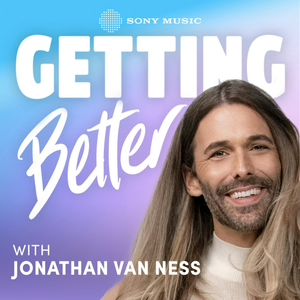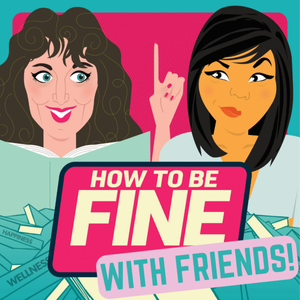
Disrupting Segregation in Chicago w/ Tonika Johnson
Explicit content warning
04/28/21 • 54 min
In this episode Tonika talks about the change she is making to desegregate Chicago through community education, policy reform, and engagement with her non-profit, the Folded Map Project. The Folded Map Project explores the present day impact of Chicago's historic segregation, showing how you can have two different kinds of lived experiences that are often on the same street, but just miles apart.
ABOUT WEEZE
Louiza Doran, known and referred to as Weeze, is a cis-het Amazigh* female-identifying human who uses she/her/they/them pronouns. She’s known as a coach, podcast host, advocate, agent of change, strategist, and educator (to name a few) but is ultimately a compassionate provocateur that is out to help folks uncover their path of possibility.
ABOUT TONIKA
Tonika Johnson is a photographer/social justice artist and life-long resident of Chicago’s South Side neighborhood of Englewood. She is also co-founder of two community-based organizations, Englewood Arts Collective and Resident Association of Greater Englewood, that mobilize people and resources for positive change. She turned the Folded Map project into a non-profit organization where she serves as Executive Director. She was named one of Field Foundation’s Leaders for a New Chicago and most recently, she was appointed as a member of the Cultural Advisory Council of the Department of Cultural Affairs and Special Events by the Chicago City Council.
IN THIS EPISODE, WE TALK ABOUT
- How Tonika’s multimedia art project and non-profit, Folded Map, explores the present-day impact of Chicago's historic segregation by using her very unique grid map to compare different kinds of lived experiences that are often on the same street, but just miles apart.
- The insidious part of segregation and racism that minimizes the intellectual ability and genius of Black and Brown youth.
- Chicago as a legacy segregated city, meaning the segregation that people witness there is literally the same kind of segregation from 50-60 years ago.
- How segregation influences social networks, relationships, access to jobs, and quality schools.
- If the very thing that divides us is race and geography, what would it be like if we actually talked to our distant neighbors about the very things that are wrong with our cities?
- How the New York Times stole the concept of the Folded Map project.
CALL TO ACTION
- Make a donation to Folded Map project
EPISODE TRANSCRIPT
FOLLOW WEEZE TO STAY ENGAGED
Website: https://www.accordingtoweeze.com
Instagram: https://www.instagram.com/accordingtoweeze
The Academy (it’s like Patreon): https://www.accordingtoweeze.com/the-academy
FOLLOW TONIKA TO STAY ENGAGED
Creator of Folded Map Project - article by Chicago Tribune
https://www.chicagotribune.com/news/breaking/ct-met-folded-map-project-chicago-20180521-story.html
In this episode Tonika talks about the change she is making to desegregate Chicago through community education, policy reform, and engagement with her non-profit, the Folded Map Project. The Folded Map Project explores the present day impact of Chicago's historic segregation, showing how you can have two different kinds of lived experiences that are often on the same street, but just miles apart.
ABOUT WEEZE
Louiza Doran, known and referred to as Weeze, is a cis-het Amazigh* female-identifying human who uses she/her/they/them pronouns. She’s known as a coach, podcast host, advocate, agent of change, strategist, and educator (to name a few) but is ultimately a compassionate provocateur that is out to help folks uncover their path of possibility.
ABOUT TONIKA
Tonika Johnson is a photographer/social justice artist and life-long resident of Chicago’s South Side neighborhood of Englewood. She is also co-founder of two community-based organizations, Englewood Arts Collective and Resident Association of Greater Englewood, that mobilize people and resources for positive change. She turned the Folded Map project into a non-profit organization where she serves as Executive Director. She was named one of Field Foundation’s Leaders for a New Chicago and most recently, she was appointed as a member of the Cultural Advisory Council of the Department of Cultural Affairs and Special Events by the Chicago City Council.
IN THIS EPISODE, WE TALK ABOUT
- How Tonika’s multimedia art project and non-profit, Folded Map, explores the present-day impact of Chicago's historic segregation by using her very unique grid map to compare different kinds of lived experiences that are often on the same street, but just miles apart.
- The insidious part of segregation and racism that minimizes the intellectual ability and genius of Black and Brown youth.
- Chicago as a legacy segregated city, meaning the segregation that people witness there is literally the same kind of segregation from 50-60 years ago.
- How segregation influences social networks, relationships, access to jobs, and quality schools.
- If the very thing that divides us is race and geography, what would it be like if we actually talked to our distant neighbors about the very things that are wrong with our cities?
- How the New York Times stole the concept of the Folded Map project.
CALL TO ACTION
- Make a donation to Folded Map project
EPISODE TRANSCRIPT
FOLLOW WEEZE TO STAY ENGAGED
Website: https://www.accordingtoweeze.com
Instagram: https://www.instagram.com/accordingtoweeze
The Academy (it’s like Patreon): https://www.accordingtoweeze.com/the-academy
FOLLOW TONIKA TO STAY ENGAGED
Creator of Folded Map Project - article by Chicago Tribune
https://www.chicagotribune.com/news/breaking/ct-met-folded-map-project-chicago-20180521-story.html
Previous Episode

Creating Economic Empowerment Through Coffee w/ Vava Angwenyi
In this episode, Vava gives us the inside scoop on what it’s like to be a Kenyan producer in the coffee industry. She shares how local producers, farmers, and prospective entrepreneurs are kept from accessing fair pay and opportunities to participate in the coffee trade, because all of the major farmlands are owned by whyte companies. Her mission is to change this through creating sustainable equity, education, opportunity, and personalizing the experience of coffee, as most consumers have no idea where their coffee comes from.
ABOUT WEEZE
Louiza Doran, known and referred to as Weeze, is a cis-het Amazigh* female identifying human who uses she/her/they/them pronouns. She’s known as a coach, podcast host, advocate, agent of change, strategist and educator (to name a few) but is ultimately a compassionate provocateur that is out to help folks uncover their path of possibility.
ABOUT VAVA
In 2009, Vava Angwenyi started VAVA COFFEE – a Benefit Corporation (B-corp) with a Social enterprise model that exports, roasts and consults on coffee value chains, the organization aims to contribute to better future prospects for coffee communities and the industry as a whole. The company ensures sustainable livelihoods for the people and communities in which it works. Vava Angwenyi is also the co-founder and director business development & fundraising at GENTE DEL FUTURO (People of the Future). Gente Del Futuro formed in 2017 is an organization born out of a partnership between African Plantations Kilimanjaro, Vava Coffee Kenya and Oro Molido three private sector players within the coffee sector to tackle two of the main problems we face as an industry - Producer profitability and Next generation involvement. Gente Del Futuro’s focus is to amplify the voices of youth by creating economic empowerment, choices and sustainability for the coffee industry. The organization offers young people a unique and one-of-a-kind learning opportunity by fusing coffee cultures and knowledge from three different growing origins : Tanzania, Kenya and Colombia. Ms. Angwenyi is also a founding member of Pamoja - Direct Trade Coffee Collective, this is a UK registered community interest company that has been established as the international marketing and distribution division for its members, coffee farmers. It is focused on building direct, cost-effective and fair relationships between its farmers and ethically aware international roasters.
Vava holds a Masters degree-Msc in International Finance and Management from University of Groningen as well as Certificate in Global Asset Management from Warrington College of Business, University of Florida and a Bachelor’s degree in Statistics & Actuarial Science from University of Western Ontario- CANADA. Vava’s vision is to challenge the status quo and promote positive social disruption within the Coffee industry. This vision comes from an inborn Kenyan passion for coffee and a drive to promote the sustainable production of coffee within Kenya’s and the wider East African region by tracing the production of high quality coffee beans to the independent smallholder coffee farmer, who works day in and day out, against major obstacles and with meager resources to produce some of the world’s best tasting coffees, often without an understanding or appreciation of the final fruits of their labor.
Vava is a CQI trained and certified Q grader Ms. Vava Angwenyi was part of the 2015 International Visitors Leadership Program a prestigious State Department sponsored program coordinated in conjunction with African Growth and Opportunities Act (AGOA)and African women enterprise program International Visitors Leadership Program.
Vava a Cordes fellow 2017 and Global Social Benefit Institute alumni 2016, also serves as an Advisory Committee member for the Specialty Coffee Association’s (SCA) sustainability council and is also part of the SCA’s Event’s site criteria Ad-hoc committee. In 2019 she was elected to serve on the SCA Board of Directors serving on the Finance and Sustainability Committees. In 2019 Vava Coffee was recognized as a Best for the world community Honoree - B Corp.
IN THIS EPISODE, WE TALK ABOUT
- While coffee is the second most traded commodity after oil, the industry was set up to keep the producers enslaved.
- The Kenyan coffee trade still operates from the rules set in 1958 by colonial masters.
- The people that own the largest plantations where coffee is produced, are whyte companies.
- The problems Kenyan coffee producers face due to whytness running the markets, dictating the pricing, and dictating the terms and conditions.
- They purposely create barriers and make it hard for local entrepreneurs to get into the coffee business.
- Why Kenyans only consume 6% (used to be 3%) of coffee produced in Kenya and have to rely on the western world to drink the beans. <...
Next Episode

From Allyship to Accomplice w/ Jamal Taylor
In this episode Jamal and Weeze talk about what it takes to truly be an accomplice in the movement. Sharing their experiences of dealing with people who claim to be allies, Weeze and Jamal drop knowledge on how to protect our peace, express love as a form of accountability, and spot the folks who just want to capitalize off of the movement.
ABOUT WEEZE
Louiza Doran, known and referred to as Weeze, is a cis-het Amazigh* female-identifying human who uses she/her/they/them pronouns. She’s known as a coach, podcast host, advocate, agent of change, strategist, and educator (to name a few) but is ultimately a compassionate provocateur that is out to help folks uncover their path of possibility.
ABOUT JAMAL
Jamal Taylor is an activist and advocate based in Louisiana. Jamal is also working to end racism as an educator in the space. He has worked tirelessly to ensure that police brutality ends across the State of Louisiana. He is an accomplished speaker that has been interviewed by the NY Times, People Magazine, People TV, Dr. Oz, and many other national outlets. Jamal believes in the power of collective organizing and has facilitated several protests across the state. Most notably he is the advocate for the family of Quawan Charles, a 15-year old boy found dead in a sugar cane ditch in Louisiana. He frequently says that when we stand we give subconscious permission for others to stand with us.
IN THIS EPISODE, WE TALK ABOUT
- Influencers who claim that they are allies of the movement, but utilize it to springboard themselves to make money.
- How to protect your peace around having to constantly deal with allies.
- Love and how it requires accountability. It’s not just a fluffy feel good word.
- Folks being accomplices at home and calling out their communities for racist behavior.
- Why people need to stop trying to capitalize off the time, energy, effort and love of people when they wouldn't do it at their job for free.
CALL TO ACTION
- Check out the Giving Way on The Sidewalk a Book and Podcast when it’s ready!!
- Elevate the issues that are important to people of color.
- Make sure your work towards becoming an accomplice is deliberate and intentional.
EPISODE TRANSCRIPT
FOLLOW WEEZE TO STAY ENGAGED
Website: https://www.accordingtoweeze.com
Instagram: https://www.instagram.com/accordingtoweeze
The Academy (it’s like Patreon): https://www.accordingtoweeze.com/the-academy
FOLLOW JAMAL TO STAY ENGAGED
https://www.instagram.com/lemmeeducateyou
If you like this episode you’ll love
Episode Comments
Generate a badge
Get a badge for your website that links back to this episode
<a href="https://goodpods.com/podcasts/according-to-weeze-180518/disrupting-segregation-in-chicago-w-tonika-johnson-15802166"> <img src="https://storage.googleapis.com/goodpods-images-bucket/badges/generic-badge-1.svg" alt="listen to disrupting segregation in chicago w/ tonika johnson on goodpods" style="width: 225px" /> </a>
Copy




